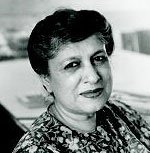Talk - 2008 - Dr Yasmin Lari
GCID Lecture - Heritage for Rehabilitation and Development: Women's traditional bead craft helps transform lives in post-earthquake hamlets of the Siran Valley, Pakistan by Yasmeen Lari

Funded by - Awards for All, and other sponsors
The Glasgow Centre for International Development, with support from the Scottish Pakistan Association and Awards for All, hosted a lecture by Yasmeen Lari SI, Chair and Chief Executive of the Heritage Foundation, Pakistan. The event took place on Monday 13 October 2008 at 5.30 pm at the University of Glasgow in the Wolfson Medical School Building, Seminar Room 3 (the Gannochy).
In the aftermath of the autumn 2005 earthquake disaster in Northern Pakistan, over 1,150 emergency one-room units were constructed in 75 villages in the Siran Valley, NWFP. This was achieved through a guided self-help project developed by the Heritage Foundation utilizing recycled materials and improved vernacular techniques.
The people of the programme area in Kodar in the Siran Valley live in isolated hamlets dispersed over a highly mountainous terrain. They suffer from low health status, abject poverty and 99% illiteracy rate, and now carry additional burdens of trauma, loss of confidence, apathy, and expectancy of generous handouts. A long term strategy for rehabilitation, women’s empowerment and development has been devised based on maximizing the community’s rich heritage assets, crafts and indigenous technology.
The project for revitalization of ancient bead craft by women, which was begun in June 2006, for the first time made women into earning members with cash in their hands. The Nokia-Karavan Craft Centre’s programme for ‘Destiny Bracelets’ has helped women of the area to overcome their trauma, gain respect and achieve a higher status within their community. This has also motivated men to participate in development programmes including making mountain pathways, constructing household kitchens and bathrooms, and implementing reforestation programmes. Increased confidence among women is also reflected in their desire to become literate, to send their girls to school, and to adopt hygiene regimes for improving primary health.
Above all, the traditional bead craft programme has brought hope, rekindled pride, and helped change mindsets from supplicant to self reliance.

